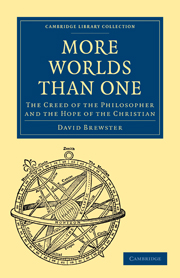Book contents
- Frontmatter
- Contents
- PREFACE
- INTRODUCTION
- CHAP. I Religious Aspect of the Question
- CHAP. II Description of the Solar System
- CHAP. III The Geological Condition of the Earth
- CHAP. IV Analogy between the Earth and the other Planets
- CHAP. V The Sun, Moon, Satellites, and Asteroids
- CHAP. VI The Motion of the Solar System round a distant Centre
- CHAP. VII Religious Difficulties
- CHAP. VIII Single Stars and Binary Systems
- CHAP. IX Clusters of Stars and Nebulæ
- CHAP. X General Summary
- CHAP. XI Reply to Objections drawn from Geology
- CHAP. XII Objections from the Nature of Nebulæ
- CHAP. XIII Objections from the Nature of the Fixed Stars and Binary Systems
- CHAP. XIV Objections from the Nature of the Planets
- CHAP. XV The Future of the Universe
CHAP. XV - The Future of the Universe
Published online by Cambridge University Press: 29 August 2010
- Frontmatter
- Contents
- PREFACE
- INTRODUCTION
- CHAP. I Religious Aspect of the Question
- CHAP. II Description of the Solar System
- CHAP. III The Geological Condition of the Earth
- CHAP. IV Analogy between the Earth and the other Planets
- CHAP. V The Sun, Moon, Satellites, and Asteroids
- CHAP. VI The Motion of the Solar System round a distant Centre
- CHAP. VII Religious Difficulties
- CHAP. VIII Single Stars and Binary Systems
- CHAP. IX Clusters of Stars and Nebulæ
- CHAP. X General Summary
- CHAP. XI Reply to Objections drawn from Geology
- CHAP. XII Objections from the Nature of Nebulæ
- CHAP. XIII Objections from the Nature of the Fixed Stars and Binary Systems
- CHAP. XIV Objections from the Nature of the Planets
- CHAP. XV The Future of the Universe
Summary
Had the doctrine of a Plurality of Worlds been one of those subjects which merely gratify our curiosity, we should not have occupied the reader's time, or spent our own, in illustrating and defending it. While the scientific truths on which it depends form one of the most interesting branches of natural theology, and yield the most striking proofs of wisdom and design, they are intimately associated with the future destiny of Man.
There are three departments of Natural Theology which demand our most earnest attention,—the living world around us, the world of the past, and the worlds of the future. In the wonderful mechanisms of animal and vegetable life with which we are so familiar, and in the inorganic structures amid which we dwell, we recognise imperfectly the innumerable proofs of matchless skill and benevolent adaptations with which they abound. Our daily familiarity with the ordinary functions of life, degrades them in our estimation. There is something which we deem unclean even in the healthy condition of animal bodies, and their functions and their products, which deters all but professional men from their study, and robs them of their inherent claims as incentives to piety, and as proofs of design. Even the chemistry of inspiration by which we live, and the science of the Eye and the Ear, on which all our intercourse with nature and with society depends, are scarcely known to the best educated of the people.
- Type
- Chapter
- Information
- More Worlds Than OneThe Creed of the Philosopher and the Hope of the Christian, pp. 253 - 259Publisher: Cambridge University PressPrint publication year: 2009First published in: 1854



